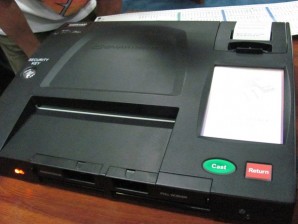Cover-up of PCOS fraud bared
MANILA, Philippines—A former employee of the Commission on Elections (Comelec) has exposed an apparent attempt by the poll body to withhold from the public the findings of possible widespread electronic manipulation of vote results in the 2013 election using the precinct count optical scan (PCOS) machines.
In a statement, lawyer Melchor Magdamo disclosed that Sen. Aquilino Pimentel III and evangelist Eddie Villanueva were among the victims of the electronic “dagdag-bawas” (vote shaving-padding) operation which was uncovered during the random manual audit conducted by information technology experts from the Department of Science and Technology (DOST).
But neither Pimentel nor Villanueva filed an electoral protest due to the late discovery of the poll fraud last year.
“They (Comelec) tried to cover up the results,” said Magdamo, the former executive assistant of then Comelec chair Jose Melo.
He added that Comelec Chair Sixto Brillantes even questioned the authority of the DOST experts when they presented the technical report on the manual audit to the Senate last December following reports of discrepancies in the PCOS and manual count of votes.
Article continues after this advertisementMagdamo said the results of the senatorial elections might have been preprogrammed in the PCOS machines as indicated in the report of the technical evaluation committee composed of IT experts from DOST.
Article continues after this advertisementThe IT experts found lines in the digital images of the counted ballots produced by almost all counting machines that compromised the vote count for senators during the last polls, he added.
Mysterious digital lines
“It was discovered to be widespread in ballots all over the country, there are mysterious digital lines that affected the vote count,” said Magdamo, a co-convenor of election watchdog group Citizens for Clean and Credible Election.
Magdamo said the presence of digital lines had the effect of an electronic “dagdag bawas” in that they added or subtracted votes for a particular candidate.
“Blank ovals were counted as votes for particular candidates once the vertical lines on the electronic image of the ballot were detected, and resulted to over vote once they appear on the shaded ovals thus nullifying the vote and eventually deducting votes from candidates voted on,” he explained.
Magdamo stressed that the digital lines were clearly one source of fraudulent election results.
Brillantes, however, on Thursday belied Magdamo’s allegations.
“This is all just part of an orchestrated move by the same group, our regular detractors, which is the AES (Automated Election System) Watch, to discredit and create confusion before the 2016 elections,” Brillantes told a press briefing.
Brillantes accused the AES Watch as being the one behind Magdamo’s claims that there was electronic vote-shaving and padding done in the last automated elections.
No role in 2013 elections
“Magdamo was already out of the Comelec by April 2010 and did not have any role in the 2013. Yet he was making claims of knowing several things,” said Brillantes.
According to Brillantes, it was obvious that Magdamo was misinformed since it was actually the Comelec that asked the DOST to conduct as assessment on the nature of the “digital lines.”
“There was no attempt to cover up. We were the ones who discovered that. We reported that to the DOST so how can they claim that we’re trying to cover up the results?” said Brillantes.
As to the digital lines, he said they have already made an initial assessment on its effects on the elections through the poll protests pending before the Comelec.
Brillantes noted that their evaluation showed that the digital lines had minimal effects on the vote counting.
“It will not have any effect on the results of the elections,” said the Comelec chief.
Nevertheless, Brillantes said they would still undertake the necessary actions to determine the presence of “digital lines” in the PCOS machines as part of their preparations for the 2016 elections.
